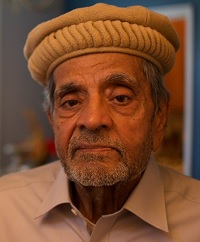
In Memory of My Father
By Fouzan Mansoor Pal, Central Virginia
On the eve of November 2, 2015, my father, Mansoor Pal, breathed his last and completed his journey back to Allah. He had a prolonged struggle with Alzheimer’s disease. He was a Musi. I write the following memoir to reminisce about his personality with those who were acquainted with him, and to introduce him to those who didn’t have an opportunity to get to know him. Regardless, I hope that this narrative inspires all readers to pray for him.
My father was born in Ranchi, India and lived most of his early life in Sialkot. He spent most of his early working career in Saudi Arabia.
Due to restrictions in Saudi Arabia, we did not have the good fortune of being part of the Jama’at ecosystem during my childhood years. In fact, my first real interaction with the Jama’at was after the age of fifteen when I moved to the U.S. While such detachment would typically have resulted in disassociation with the Jama’at, I strongly believe that I remain today an active member of the Jama’at due to the fervent prayers of my father and the grace and mercy of Allah.
Jama’at members who knew my father typically use words such as “timid,” “patient,” “quiet,” and “harmless” to describe his personality. He was a man of few words, often minding his own business and not engaging in discussions around politics or current affairs that are typically the subject of many informal gatherings. Even regarding Tarbiyat of his children, he would take the approach of expressing his like or dislike through indications or signals rather than direct lectures or actions. In spite of his serene personality, I clearly recall spikes of emotions, all of which were directed against ideas or persons who criticized the Jama’at in any way. He had great love for the Holy Qur’an. During his healthy life he would spontaneously recite verses in support of his statements. Even during the early part of his Alzheimer’s, he would complete verses of Surah Fatiha if one recited a part thereof—this was during a time when he didn't recognize his own children, didn't know day from night, or have any recollection of where he was. Later on, as the disease progressed, his ability to speak sensibly gradually diminished. But even in this state, his eyes would often fill up with tears upon hearing the recitation of Holy Qur’an.
During his healthy life, he was physically very active and never wanted to delay anything till the next day. He would do many house chores himself without being asked. In fact, after I got married, my wife would often tease me that I had it so easy since my father would do all the grocery, mow the lawn, take care of the car repairs, etc.
I recall many instances of sacrifices he made, putting the interest of others--his family and strangers alike--over his own. He was not wealthy, but when it came to spending in the way of Allah, he was very generous. In addition to obligatory and voluntary Chanda, I often saw him giving cash or other form of assistance to anyone in need. In the days following his demise, our family heard from so many people—many of whom we didn't even know had acquaintance with my father—mentioning that he had given them a ride to the hospital, installed MTA dish at their house, or helped them in one way or another.
Many people who knew my father here in the U.S. remember him for his MTA dish installation work—a passion that resulted from a genuine concern for the well being of Ahmadi households. He strongly believed that MTA was a definitive way to save Ahmadi households from the ill effects of the society and to attach children and adults alike to Khilafat. He was also one of the first to work at the satellite earth station at Baitur-Rahman.
Parents do a lot for their kids. I look back and wonder what was the most important gift he left for his kids—love and care, education, a good life. But ultimately it was the gift of Ahmadiyyat that is most prized. He had received this gift from his father, Muhammad Din Pal, who had accepted Ahmadiyyat during the time of Hazrat Khalifatul Masih II (may Allah be pleased with him), and had fulfilled his responsibility of passing it on to us.

